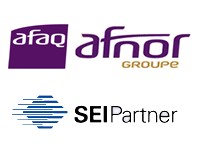1. What is Software Certification?
Certification is formal recognition of a level of proficiency in the information technology (IT) quality assurance industry. The recipient is acknowledged as having an overall comprehension of the disciplines and skills represented in a comprehensive body of knowledge for a respective software discipline.
2. Why become Certified?
As the IT industry becomes more competitive, the ability for management to distinguish professional and skilled individuals in the field becomes mandatory. Certification demonstrates a level of understanding in carrying out quality assurance principles and practices. Acquiring the designation of CASQ, CSQA, CMSQ, CQPSE, CSPE, CSBA or CSPM indicates a professional level of competence in the principles and practices of quality assurance in the IT profession. CASQs, CSQAs, CMSQs, CSPEs, CQPSEs, CSBAs and CSPMs gain recognition as software quality profession, achieve potentially more rapid career advancement, and gain greater acceptance in the role as advisor to management.
3. What is CBOK(Common Body of Knowledge)?
This guide is designed to help you prepare for the DQS Certification™ India Exams. It gives you some background, points the way to study material, provides some study strategy, and imparts some Exam-taking tips. This Guide is for mortals with too little time to study and too many other things with which to occupy our minds, like work and family. It gives the reader the benefit of our corporate experience with the Exam.
4. Since there already is a Certified Project Manager Program, why is a program for Certified Software Project Manager needed?
There are similarities and difference between a General Project Manager and a Software Project Manager. The two major differences associated with software are:
- The specificity of software requirements is usually less than most project requirements; and
- The ability to produce effective and efficient software is heavily dependent on the process maturity of the organization building the software.
5. What are the similarities between a General Project Manager and a Software Project Manager?
Most of the skills needed by a General Project Manager are also associated with Software Project Manager. These include staffing the project, setting a budget, working with customers, developing a project plan, and monitoring the project and creating status reports.
6. How does the level of software process maturity affect Project Management?
At the beginning levels of process maturity, there is huge process variability. Since most IT organizations are in the earliest stages, Software Project Managers must deal with this high level of variability. In other words, the Software Project Manager must use software development processes, which do not work effectively or efficiently.
7. What is the difference between software requirements and regular project requirements?
Software requirements rarely specify security requirements, maintainability requirements, ease of use requirements, interoperability requirements, contingency measures and/or and training for new team members.
8. Why would IT management want a special certification for Software Project Managers?
IT has a history in building software projects way beyond budget, and schedule resulting in dissatisfied customers/users. IT management and IT customers would welcome any program that could help improve projects on time and within budget with high customer satisfaction.
9. What is unique about software project management as opposed to general project management?
There are many, but some of the more significant differences are:
- Interfacing application software into an operational environment with many different software packages;
- Interfacing one application with many, many different applications, the problem in one could result in a cascading of errors through others;
- Software generally can be penetrated from anywhere in the world, which is not normally a problem for most projects;
- Technology changes rapidly necessitating the constant learning and upgrading of software to meet new technological requirements;
- Estimating project costs and schedule is difficult when the developmental processes have high variability;
- The methods and types of failure associated with software is significantly different than with other types of projects; and
- Software systems must take into account all of the types of errors that could occur, which is an almost impossible task.
10. Would the CSQA and CSTE be valuable if I am a Software Project Manager?
Yes, they are building blocks that contribute toward good project management since they address fundamental issues of process management, sound quality assurance and testing practices, and other significant skills needed for Project Managers.
11. I do not have the necessary samples or my company won’t allow me to submit the required documents, can I still apply?
There will be the choice of taking an exam for CSPM.
12. What certifications are available?
Certifications of Software Professionals are structured around comprehensive courses that provide Candidate with hands-on experience with QA Professions.
Certifications include:
- DQS Certification™ Certified Associate Software Quality – CASQ
- DQS Certification™ Certified Software Quality Analyst – CSQA
- DQS Certification™ Certified Manager of Software Quality – CMSQ
- DQS Certification™ Certified Software Process Engineer – CSPE
- DQS Certification™ Certified Quantitative Software Process Engineer – CQSPE
- DQS Certification™ Certified Software Process Manager – CSPM
- DQS Certification™ Certified Software Business Analyst – CSBA
- DQS Certification™ Fresher Certified Associate Software Quality (CASQ) Foundation
13. Where can I take a certification exam?
Walkin Exam is available in all working days. You can register for any Certification of Software Profession exam and earn your certification.
14. Do I have to take classes in order to take the exams?
No, it is possible to take an exam with only your own experience and self-study using the CBOKs. You can purchase CBOK for all Certifications.


